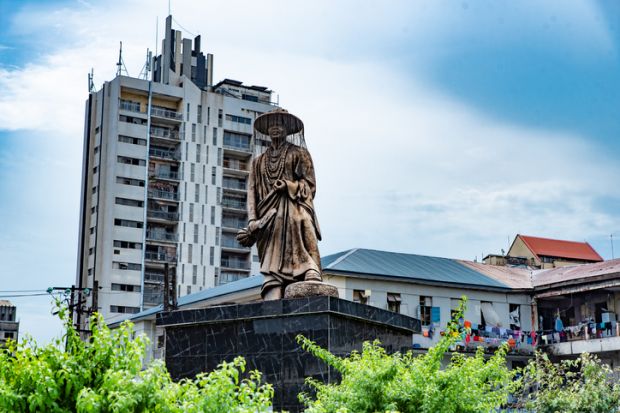A university’s decision to axe a groundbreaking African history course and make its founder redundant is facing legal challenges from students and equality groups.
The University of Chichester suspended recruitment on to the master’s by research (MRes) in the history of Africa and the African diaspora in July 2023, stating that it was no longer economically viable.
Hakim Adi, the first African-British historian to become a professor of history in the UK, who started the course in 2017 as a way of ensuring that more students of African and Caribbean heritage train as historians, lost his job at Chichester shortly afterwards.
The legal firm Leigh Day now has now initiated legal action on behalf of a group of 14 students who were either studying on the course or conducting PhD research and who allege that they have suffered discrimination and breach of contract because of the decision.
The students have been through the university’s internal complaints procedure, Leigh Day said, and failed to achieve a resolution, so a letter before action was issued to the university on the students’ behalf on 15 February.
At the time of its decision, Chichester defended the move by stating that the course had been “extensively marketed” but had attracted only small numbers of students, meaning that it had cost £700,000 to run but had recouped only £150,000 in tuition fees in its six years in existence.
In Leigh Day’s letter outlining the case, however, lawyers allege that “no account appears to have been taken of the fact that the university has not adequately marketed the MRes”.
“Furthermore, Professor Adi’s employment preceded the development of the MRes and therefore should not be associated with one course,” Leigh Day said.
“In addition, no account appears to have been taken of the recruitment of PhD students Professor Adi supervises, nor the fact that many have been recruited directly from the MRes.”
Jacqueline McKenzie, a partner at the firm who is representing the students, said the course closure “has stopped our clients’ academic careers in their tracks” and “they are urging it to reverse this decision and ensure sure that they can resume their studies as soon as possible”.
Professor Adi said the course had succeeded in encouraging many more black students to embark on PhD research and had helped to establish “one of the largest cohorts of black postgraduate history students in the country”.
“As a result of the measures taken by the University of Chichester, these students have been left without appropriate supervision, and their studies have been completely disrupted,” he added.
In a linked case, the Black Equity Organisation (BEO) – a civil rights charity – has issued a judicial review claim that challenges the university’s decision to suspend the course on the grounds that a consultation or equality impact assessment was not carried out.
The body has started a crowdfunding campaign aiming to raise £5,000 to support this effort and has so far received just short of £2,000 in pledges.
“The impact of the university’s decision is short-sighted and reaches beyond the students on the MRes and those studying for a PhD,” said Kehinde Adeogun, the director of legal services for BEO.
She said that the course was “an acknowledgement of the lack of teaching, research and learning in the history of Africa and the African diaspora” and that suspending it without consultation “when the issues are still prevalent, decreases the opportunity for change”.
A spokesperson for Chichester said the claims made by the law firm were “both inaccurate and misleading”.
“For clarity, the MRes programme referred to has not been ‘terminated’ for existing students but is only suspended to new applicants pending a review. PhD students study individual programmes of research and should not be conflated with the MRes programme,” they said.
“The university is committed to ensuring that all existing students are able to complete their studies successfully and that alternative teaching and supervisory arrangements are in place for these students.”
Register to continue
Why register?
- Registration is free and only takes a moment
- Once registered, you can read 3 articles a month
- Sign up for our newsletter
Subscribe
Or subscribe for unlimited access to:
- Unlimited access to news, views, insights & reviews
- Digital editions
- Digital access to THE’s university and college rankings analysis
Already registered or a current subscriber? Login








